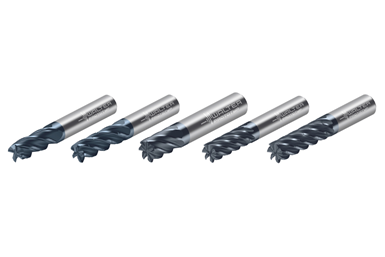Walter Milling Tools Cut Difficult-to-Machine Materials
Walter has expanded its solid carbide milling offering with new inch tools for hard, high-temperature alloys.
Share





Walter USA has expanded its offerings in shoulder/slot mills for cutting super alloys and other high-temperature alloys, titanium and stainless steel (ISO S- and M-material groups).
The MA377/MA373 Supreme milling cutters (featuring four, five and six flutes) for machining titanium and stainless steels are available in sizes from 0.125" to 1.25" diameter. The tools are available with or without corner radii, and with or without chip splitters. With Walter’s optimized tool coatings, these mills are suitable for slotting, peripheral milling, trochoidal milling and high-efficiency milling. The offered chipbreaker reduces chip nesting issues and deflection stemming from excess tool pressure.
The MD177/MD173 Supreme milling cutters (featuring seven flutes) have more teeth to boost productivity when machining titanium and high-temperature alloys. The tools are available in sizes from 0.25" to 1" diameter. The uneven pitch on the tools reduces vibration and enables the entire length of the cutting edge to be used to provide uniform wear. The cutting tools supply outstanding productivity and process reliability.
The MD177 cutter creates exceptionally smooth surfaces without “waterlines.” The MD173 is equipped with chipbreakers that provide outstanding process reliability with high metal removal rates.
The MA375 Supreme cutter (featuring four, five and seven flutes) is for roughing and finishing Inconel and other nickel-base super alloys. The tool is available in sizes from 0.125" to 1" diameter and features a variable helix and variable indexing to help reduce chatter and boost productivity. The four- and five-flute versions are for aggressive slotting up to 0.5" diameter, peripheral milling and trochoidal machining. The seven-flute mill is designed for dynamic machining and excels at high workpiece hardness levels.
Related Content
-
Briquetting Manufacturer Tools Up for Faster Turnaround Times
To cut out laborious manual processes like hand-grinding, this briquette manufacturer revamped its machining and cutting tool arsenal for faster production.
-
High-Feed Machining Dominates Cutting Tool Event
At its New Product Rollout, Ingersoll showcased a number of options for high-feed machining, demonstrating the strategy’s growing footprint in the industry.
-
Form Tapping Improves Tool Life, Costs
Moving from cut tapping to form tapping for a notable application cut tooling costs at Siemens Energy and increased tool life a hundredfold.






















.png;maxWidth=300;quality=90)


